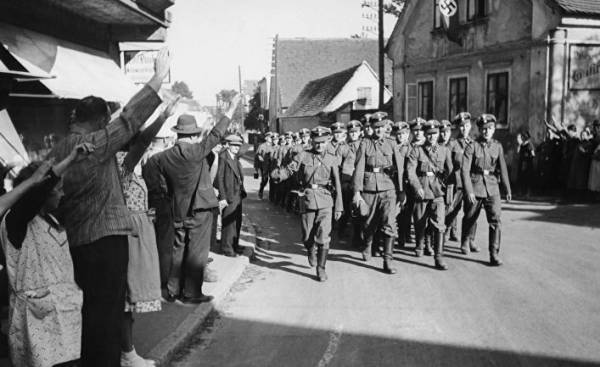
The world is currently haunting the specter of Nazism. Andy Martin believes that the current Zeitgeist in America, that is the spirit of the time, reminiscent of Paris 1968. His opinion is subjected to clarification: the legendary critic Harold bloom (Harold Bloom) believes that the situation is more reminiscent of Berlin in 1934.
“You’re a bit like a Nazi.” I have several times heard these words in different variations. I’d say more similar to the Nordic type. Mostly Viking, if you insist. When I was a kid, my best friend’s dad — Irish, the last Second world war (the real father, in other words) — was convinced that I must have a strong connection with Germany. At the genetic level. The descendant of a wandering Luftwaffe officer, who may, in the area of the East End. “You’re in the ashes of bombed Romford!” usually he told me with a smile and with some respect. It is clear that it was useless to argue.
Maybe it makes sense to explain why I liked the book of Philip K. dick “the Man in the high castle” and a book of Lena of Dayton “SS-WB” (Len Deighton’s “SS-GB”) even before they have been removed so a popular television series. What would happen if the Nazis won? My old Irish friend was convinced that I would be able to adapt. Would look great in a long leather coat and boots. Shining and prosperous. Material for replenishment of the officer corps. As for my own fantasies regarding the Second world war, I would like to emphasize the following: I imagined myself with such knowledge of the French language that I could parachutiste in occupied France, behind enemy lines.
There, posing as a local resident, I could blow up a rail line would join the guerrillas and the bouncers would brain Fritz. All these do not correspond to the facts and biased against the Nazis works are in fact trying to imagine what it would be in France if you’d stayed in Paris and could not, like Humphrey Bogart in the movie Casablanca, to catch the last train before joining the Nazis in Paris.
But I don’t think I could endure torture if I got caught due to incorrect use of the subjunctive mood in the simple past tense, or a lasting British accent. The desire to torture the prisoners always seemed to me to be the hallmark of Nazism. That is why I recommend to President Trump and all the other people who believe that torture “work” is not a fantasy and not fiction, but a well-documented report about the adventures of a wartime Lieutenant Colonel aviation forest “Tommy” Yeo-Thomas (Forest “Tommy” Yeo-Thomas). Their stories are told in published in 1952 the book “White rabbit” (one of his aliases) Bruce Marshall (Bruce Marshall).
Early in the war Tommy, the French language was flawless, works as a Manager in a luxury fashion house in Paris. He joined the Royal air force; armed with machine guns and grenades at the Wall, he makes several bold operations to support the French resistance, and then he was invited to 10 Downing street, where the interview with him conducted by Churchill, in 1944, the night he dropped by parachute somewhere in the French countryside. However, as a result of the betrayal he is detained by the Gestapo officers in the area of metro station Passy (Passy), Paris.
He’s beaten to a pulp, chained with handcuffs and kept in an uncomfortable position, stripped naked and beaten, subjected to torture originated then with water (waterboarding), that is, almost drowning him in a normal bath and then revive, and so many times; then it used the terrible torture using electric discharge in the area of genitals, but somehow, despite all this natural terror and horror, it manages to maintain critical information and to save his friends from arrest and further torture.
“A pig, a jerk, a terrorist” (Schweinhund, salaud, terroriste) — with such words addressed to him by his tormentor in bilingual anger. Ultimately, Tommy falls into the camp of Buchenwald, but he, surprisingly, manages to escape, he remains alive, and after the war returned to his salon in Paris. Undefeated. I welcome the extraordinary stoicism, toughness and bravery of these real-life heroes as Yeo-Thomas (according to Ian Fleming, he became one of the prototypes of James bond). Conversely, those people who used water torture and all sorts of other things may well wear Nazi insignia, regardless of the business they serve. It’s just revived by the Gestapo. I will always be on the side of these guys in the bathroom.
But there’s another reason — even if I was late for the last train from Paris — I could never surrendered to the Nazis. It is impossible to understand the appeal of Nazism, if you do not see that blatant will to power and sadism, there is also Nazi aesthetics. Incarnation for me — probably the opposite of torture, the end of the cultural spectrum, is the picture of Saliger Ivo (Ivo Saliger) 1939 “the judgment of Paris” (currently it is in the German historical Museum). Hitler, a great artist who hated the “ugliness” that is, according to his beliefs, any deviation from the purity, or lack thereof. Art exhibitions in the 30s and 40s the years of Nazism was actively represented and idealiziruete, and, in addition, strictly adhered to the clearly defined rules of physiology. Ivo Saliger was the artist who slavishly tried to Woo his Fuhrer.
The original story “judgment of Paris” is rooted in Greek mythology. Paris, a handsome guy, got the job (from Zeus) — he had to choose “most beautiful” of the three naked goddesses and give her a reward “Golden Apple” (he picks Aphrodite, which in return makes you fall in love with him Helen of Troy, and thus begins the destruction of Troy). The picture of Seligere we see a member of the youth organization of the Hitler youth, which lies on the grass in the leather short pants, and selects the archetypal flexible and thin blonde. Only blondes fit. Two women with dark hair and rejected already wear their clothes. Short distance is a wall. The point is this: if you look correctly, you’re in, and if your data does not meet your criteria, you’ll be outside.
In any case, the Greeks were more concerned with archetypes of male beauty. One day I was in Athens at the Museum with a Greek friend, and there was a large number of very stately images of male figures. They were all bearded and muscular, they were ready to throw the disk, spear or something. Very masculine. To the limit. My Greek friend who absolutely was not similar to that exhibited in the sculpture Museum, drew my attention to the disproportionately small size of the classical Greek male statues. My Greek friend had a theory about that. “It seems that the sculptors wanted to give all of us a chance,” he said.
It’s a good theory. I think that this was the Greek philosophy. It starts with Socrates who, as we know, was ugly. His whole philosophy is a critique of the obsession with which the Greeks treated to what looks beautiful and perfect. Greek tombs, actually. Or statues. The reality, as he successfully argued, is not beautiful. If you examine it more closely, it turns out that it is a chaos. Nothing’s perfect. No one is perfect. Philosophy is a satire on our obsession with beauty. Sorry that he had made a fundamental error, stating that the beauty, perfection and truth will be ultimately attained to some sublime transcendent eternity (although I suspect that he had doubts on this score). Or, as he formulates it is irrefutable, “Only beautiful (to katon) can be truly wonderful”.
Nazism is a clever translation of naked Greek archetypes with the addition of torture. In Paris in 1940-e years, even before his military defeat, he faced the superior forces of existentialism. Their expression was Jean-Paul Sartre and albert Camus, however, none of them was subjected to the trials that befell Tommy Yeo-Thomas. Nevertheless, they strongly disliked the idea of Nazism, which had to adapt. Sartre, in particular, liked to call himself “ugly jerk” (and Simone de Beauvoir agreed with him). His autobiographical book “Words” is an inverted story, in which he of the curly-haired “angel” turns into a “toad”. Camus was largely Humphrey Bogart French philosophy — he declared himself the enemy of existentialism (all true existentialists were obliged to do so) and was considered rather Absurdistan. However, for both of them to be ugly was OK, and they believed that a person has the right to be “outsider” (as in the Camus novel “the Stranger”).
Sartre and Camus were the Lennon and McCartney of those days, and so they were doomed to split. However, “Being and nothingness” (Sartre), and “notes of a rebel” (Camus) can claim to be a hymn, a cry, a paradox and a poem of rebellion. Revolt against what? Against almost everything, but especially against Nazism and totalitarian mentality, according to which all critics are necessarily “enemies of the people”.
Sociologist Emile Durkheim (Emile Durkheim) in the first years of the XX century claimed that the main reason for suicide is “anomie”, i.e. as “bezdarnosti” in which the individual freely departs from existing norms in society. Sartre and Camus, each in its own way, interpretiruya it and say that the real problem is the normativity, the introduction of too many rules and criteria. Each person potentially or actually is anominal an outsider, feel lonely even in a crowd. We should not look the same, talk the same, wear the same clothes or be “integrated”. We need to overcome our tribalism. And there is timeless perfection to which we could appeal — all we have is one life, one chance. And, above all, there is nothing wrong with being a loser. All fail. All, ultimately, are the losers. For Nazism, on the contrary, the value had above all to win.
In addition to the “Man in the high castle” and “SS-WB” my attention is focused on held yesterday evening panel discussion with the participation of neoaristotelean in the festival of Literature at the London school of Economics under the title “existentialism is easy” (Existentialism is Easy). And merci beaucoup, thank you very much for the Embassy of France for organized discussions after dinner. Position, mood, metaphysics, all the evidence suggests that existentialism is not dead. But at the same time it seemed to me that there may be a parallel event called “the Nazis — it was easy.”
The totalitarian temptation is always present. This is a permanent capacity within the human experience. He has not disappeared. Anyone can go mad. Any nation can go mad. So Camus at the end of his novel “the Plague” brings his allegory about the Second world war: “For he knew… that the germ of the plague never dies, never disappears, that it can decades to sleep somewhere in the curls of furniture or pile of clothes, patiently waiting in the wings in the bedroom, in the basement, in a suitcase, in handkerchiefs and in papers, and that might come on the mountain and in teaching people a day when the plague will awaken rats and send them to die on the streets of a happy city.”
It is now over the world haunting the specter of Nazism. I recently went to Yale to talk to 80-year-old Harold bloom (author of the book “Shakespeare: the Invention of man” and coming soon “Shakespearean characters”). I told him that the new Zeitgeist in America, the new spirit of the time, reminiscent of Paris in 1968. “No, not like” — he said. Part of the humor, he will not yield and Falstaff, but nevertheless he said, “More like Berlin in 1934”.
Andy Martin is a lecturer at the University of Cambridge.







